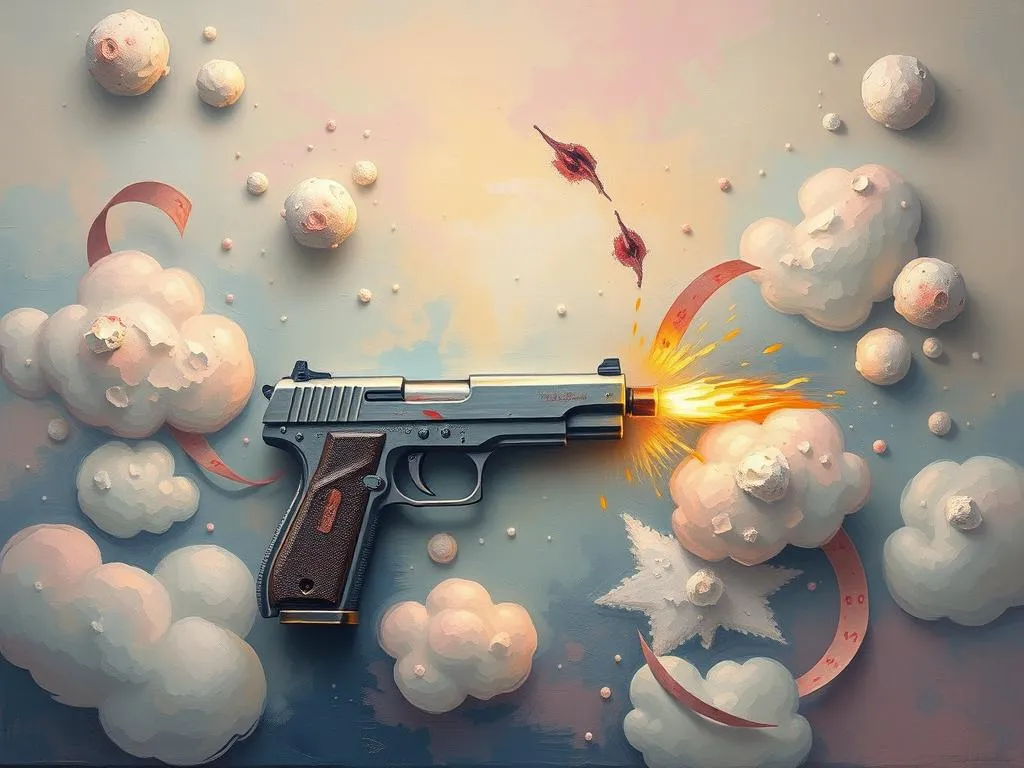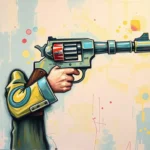
Dreams can be powerful vessels of our subconscious thoughts and feelings, often manifesting in vivid and sometimes unsettling imagery. Among these, dreams involving gun wounds can evoke a strong emotional response, leaving the dreamer puzzled and introspective upon waking. These dreams resonate deeply due to their association with violence, trauma, and vulnerability, making them a significant area of interest for both dreamers and those who study the symbolism of dreams. In this article, we will delve into the various interpretations of gun wounds in dreams, exploring their symbolism, key scenarios, and connections to our waking lives.
Symbolism and Meaning
Dreams featuring gun wounds often carry a multitude of symbolic meanings that can vary widely depending on the context of the dream and the dreamer’s personal experiences. At their core, these dreams can represent feelings of pain, fear, or threat, not just in a physical sense but also emotionally or psychologically. Guns, as symbols, typically signify power, control, and sometimes aggression. Consequently, a gun wound in a dream might reflect a situation in the dreamer’s life where they feel attacked, vulnerable, or exposed to danger.
From a psychological perspective, experiencing a gun wound in a dream could symbolize an internal conflict or an emotional wound that has yet to heal. Such dreams might highlight feelings of inadequacy or insecurity, urging the dreamer to confront unresolved issues that are causing them distress. The act of being shot or wounded can also signify a loss of control over one’s life circumstances, suggesting that the dreamer might feel overwhelmed by external pressures or emotional turmoil.
Additionally, cultural context plays a crucial role in interpreting dreams about gun wounds. In societies where gun violence is prevalent, these dreams might evoke more immediate fears and anxieties about safety and personal security. Conversely, in cultures where firearms are less common, such dreams might symbolize broader themes of aggression, conflict, or interpersonal struggles, rather than literal threats to safety.
In essence, dreaming of gun wounds serves as a poignant reminder of the vulnerabilities present in our lives, whether they be physical, emotional, or psychological. It invites us to explore what these wounds signify on a deeper level, offering insights into our fears, conflicts, and the need for healing.
Key Scenarios and Variations
The interpretation of gun wounds in dreams can shift dramatically based on the specific scenarios presented. For instance, if a dreamer experiences the sensation of being shot but does not feel immediate pain, it could indicate a detachment from their emotional state, suggesting that they may be coping with trauma by distancing themselves from their feelings. This detachment might be a defense mechanism, allowing them to navigate through the complexities of their emotional landscape without fully engaging with the pain.
Alternatively, a dream in which the dreamer witnesses someone else being shot may symbolize feelings of helplessness or guilt. This scenario can reflect the dreamer’s fears about their inability to protect loved ones or a sense of responsibility for others’ well-being. Such dreams may prompt reflection on the relationships in the dreamer’s life, highlighting areas where they feel they are falling short or unable to provide support.
Another common variation involves the dreamer shooting someone else. This scenario often delves into themes of anger, retribution, or self-defense. It might indicate that the dreamer harbors unresolved feelings towards someone in their waking life, perhaps stemming from a past conflict or perceived betrayal. In this context, the gun wound becomes a metaphor for the emotional scars inflicted by others or even by oneself, pointing to the need for confrontation and resolution.
Dreams of being shot in a familiar setting, such as at home or work, may also reflect feelings of invasion or violation of personal space. Here, the gun wound could symbolize a breach of trust or personal safety, compelling the dreamer to examine their boundaries and the dynamics of their relationships. On the other hand, if the dream takes place in a public space, such as a street or a crowd, it may evoke feelings of anonymity and vulnerability in a chaotic world, mirroring societal anxieties about violence and insecurity.
Each variation of the gun wound scenario brings its own set of interpretations, allowing for a rich tapestry of meanings that can resonate differently with each dreamer. By examining the context, emotions, and details surrounding the dream, individuals can uncover significant insights into their personal experiences and emotional state.
Real-Life Connections and Takeaways
Understanding the symbolism behind gun wounds in dreams can provide valuable insights into the dreamer’s waking life. These dreams often serve as a mirror reflecting unresolved issues, fears, or emotional wounds that require attention. To connect these dreams with real-life situations, readers are encouraged to engage in self-reflection and explore the emotions and circumstances surrounding the dream.
One practical approach is to maintain a dream journal, recording not only the details of the dream but also any emotions felt during the experience. This practice can help illuminate patterns or recurring themes that may point to areas of stress or unresolved conflict in the dreamer’s life. Additionally, engaging in mindfulness or therapeutic practices can aid in processing these emotions and addressing the underlying issues represented by the dream.
For those who find themselves frequently dreaming of gun wounds, it may be beneficial to seek support from a mental health professional. Exploring these dreams in a safe and guided environment can facilitate healing and provide strategies for coping with the emotions they evoke. Therapy can also help the dreamer develop healthier coping mechanisms, allowing them to confront fears and vulnerabilities more effectively.
Moreover, reflecting on the relationships in one’s life can be instrumental in understanding the context of these dreams. Are there unresolved conflicts or feelings of anger that need to be addressed? Are there boundaries that require reinforcement to ensure personal safety and emotional well-being? By examining these aspects, readers can gain clarity on how their dreams relate to their waking experiences and take proactive steps toward resolution.
In conclusion, dreams involving gun wounds can be deeply unsettling but also rich with meaning. They serve as an invitation to explore our vulnerabilities, confront our fears, and seek healing. By engaging in self-reflection and understanding the symbolism embedded in these dreams, readers can unlock valuable insights that pave the way for personal growth and emotional resilience. Embracing the power of our dreams and their messages can ultimately lead to a more profound understanding of ourselves and our experiences, fostering a sense of empowerment in navigating the complexities of life.







